This piece is for anyone who's tired of being dismissed by the self-appointed AI authenticity police. If you've watched people roll their eyes at AI-assisted content, if you're fed up with the purity police deciding what counts as 'real' creativity, if you're exhausted by people who think your tools matter more than your impact—this one's for you. x
I can't stop thinking about this strange new breed of internet troll—the ones who have this compulsive need to sniff out AI in writing like bloodhounds trained to detect literary contraband. They've appointed themselves the authenticity police and, according to them, business is booming. I knew it was happening out there, of course, but it didn't really hit me until someone accused my most-read piece of being "obviously AI-generated." Suddenly I found myself in that peculiar modern position of having to defend not just my ideas, but my entire process of thinking them.
But here’s what I find incredibly funny about all this: I've never hidden my AI use. I've written entire essays about how I've integrated it into my workflow, how it's become as essential to my thinking process as my morning coffee or my evening walk with the dogs. I’ve even written about the decels themselves. Anyone who follows me on 𝕏 knows this better than anyone—I meeeaan, my account that I grew to almost 100k people in 18 months literally started as an AI art account (lol!)
My very first viral post was actually a series of AI-generated images I called "Casual Presidents"—reimagining what U.S. presidents might look like in modern, everyday clothes. The whole thing was sparked by the cultural moment when everyone was losing their minds over John Fetterman wearing hoodies and sweatshirts. My thoughts on him as a politician aside, it got me thinking: what if we saw our most formal, historical figures in the most casual possible way? The images went viral, and while there were the predictable AI haters in the comments, most people were genuinely delighted by this new way of seeing these iconic figures. It opened up conversations about formality, accessibility, and how we relate to power that wouldn't have happened otherwise.
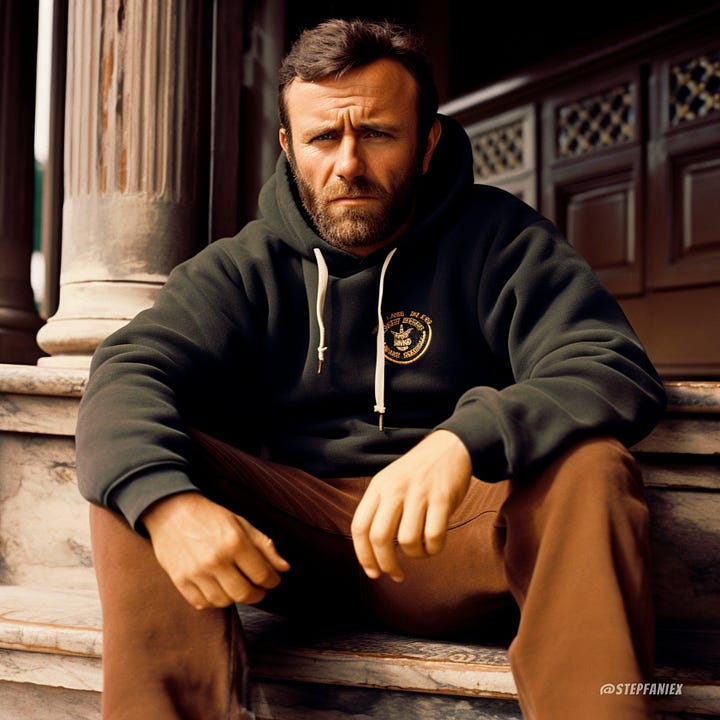
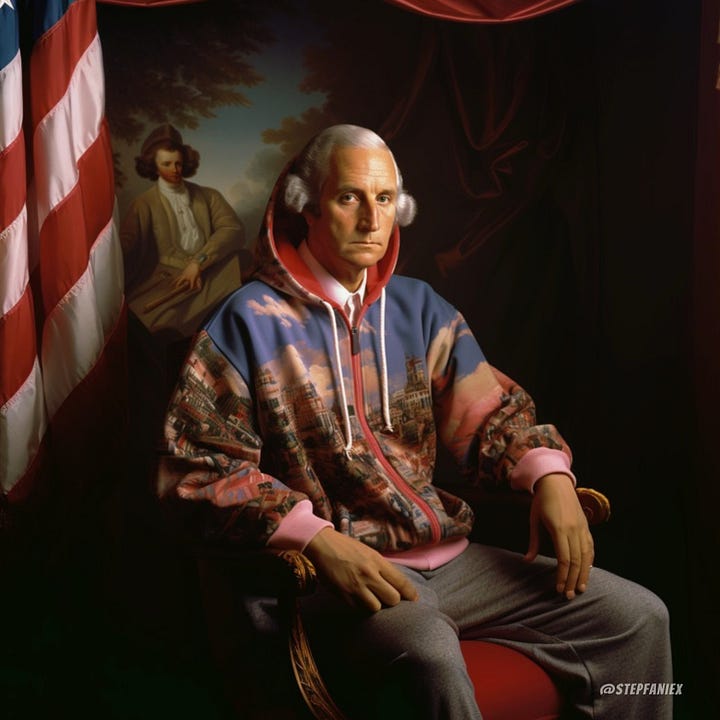

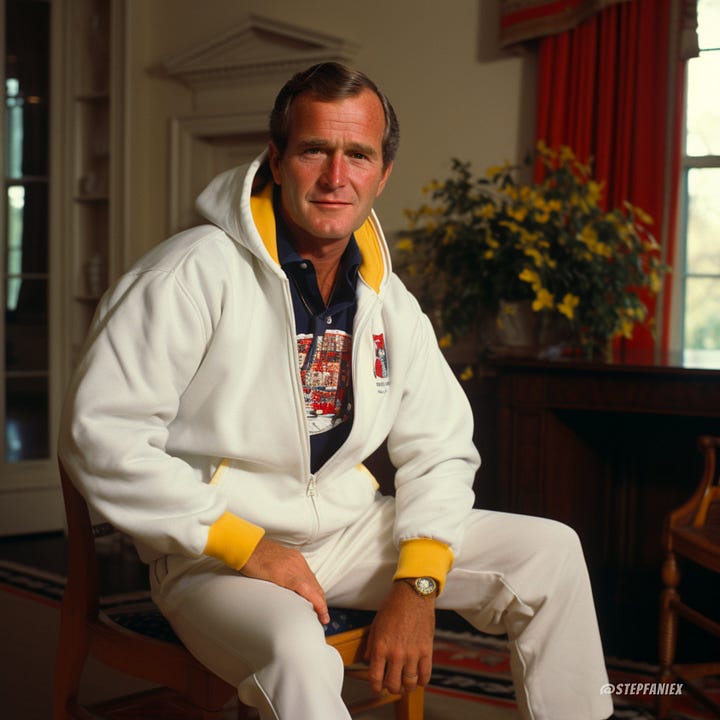
But for me, the breadth goes even deeper than visual art and writing. Earlier this year, I released a 19-song album titled speedrunning love. That sentence alone would have been impossible for me to write a few years ago, not because I lacked the creativity, but because I lacked the technical means. I've been interested in songwriting since I was a kid, spending entire afternoons in my room with notebooks, writing lyrics and melodies that lived only in my head. For over a decade, I had this collection of songs that felt real to me, complete in my mind, but trapped there because I never learned to properly play an instrument, never had the technical skills to translate what I heard internally into something other people could actually listen to.
AI tools became the bridge that finally let me bring those songs into the world—not by doing the creative work for me, but by handling the technical execution I'd never mastered. The lyrics, the emotional core, the stories I wanted to tell were all mine, written over years of late-night journaling and humming melodies to myself. The tools simply gave me a way to bring those songs to life.
The truth is, I use AI for everything from untangling my journal entries to figuring out whether that weird bump on my dog's leg will require a vet visit. Visual art, music production, writing assistance, daily problem-solving—I've been exploring the full spectrum of what these tools can do since they first became available. I was posting Midjourney creations when the platform was still new, experimenting with AI music as soon as it launched. I'm not in the business of deception—I'm in the business of efficiency, and I’ve always been pretty transparent about that.
But apparently, honesty about your tools is still not enough for the purity police.
To date, over five thousand people have resonated with my most-read piece mentioned above. Five thousand individual humans found something in those words that spoke to their experience, that made them feel less alone in whatever they were struggling with. But apparently, none of that mattered because some keyboard detective decided my syntax was too clean, my transitions were too smooth, my thoughts are too organized to be genuinely human.
Like, sorry I didn't leave in enough "ums" and repetitive tangents to satisfy your authenticity meter.
It does have me wondering though: when did we become so afraid of our own tools?
This isn't new, of course. We've been here before, again and again, each time a new technology threatened to blur the lines between human and machine, between authentic and assisted creation. The pattern is so predictable it's almost boring.
Plato (you might have heard of him), writing in the Phaedrus around 370 BCE, worried that the written word would destroy human memory and authentic knowledge:
"If men learn this, it will implant forgetfulness in their souls; they will cease to exercise memory because they rely on that which is written, calling things to remembrance no longer from within themselves, but by means of external marks."
Plato feared that writing—writing!—would make us intellectually lazy, that we'd lose touch with the pure, unmediated truth that came from within. He was worried about the same thing we worry about now: that our tools might make us less human, less authentic, less real.
The Chinese philosopher Zhuangzi, writing around the same time, told a story that feels eerily relevant. A craftsman refused to use a mechanical device that would help him draw water from a well more efficiently, saying: "Where there are ingenious contrivances, there are sure to be subtle concerns, and where there are subtle concerns, there are sure to be impure hearts."
Even then, there was this sense that efficiency itself was somehow corrupting, that the authentic way was necessarily the harder way.
When photography was invented in the 1800s, painters declared it was the death of "real" art. How could a mechanical device that simply captured what was already there compete with the human hand interpreting reality? The French painter Paul Delaroche supposedly proclaimed, "From today, painting is dead!" when he first saw a photograph.
Spoiler alert: painting survived. In fact, photography freed painters from the obligation to simply document reality, leading to Impressionism, Cubism, and abstract art. But nobody wants to talk about that part.
Then came digital photography, and film photographers went through the same pearl-clutching. "Digital isn't real photography!" they cried. "You're not a real photographer if you're not dealing with the grain, the chemistry, the darkroom!" As if the struggle itself was the point, rather than the image you created.
Musicians went through this when synthesizers arrived, then again with digital recording, then with Auto-Tune, then with digital music production software. Each time, the purists declared the death of "authentic" music. Each time, artists adapted and created new forms of expression.
Honestly, even spell-check was controversial when it first appeared. Writers worried it would make us lazy, that we'd lose our instinctive understanding of language. (Plato, meanwhile, was probably rolling over in his grave going, "I TOLD YOU SO about this whole writing thing!")
Every generation thinks their tools are corrupting human authenticity, and every generation is proven wrong when the next generation uses those tools to create something beautiful.
the romantic myth of pure creation —
I think we inherited something toxic from the Romantic movement's obsession with the solitary genius creating ex nihilo—literally "out of nothing." Picture the tortured artist alone in their garret, wrestling with the muse, bringing forth original masterpieces through pure individual inspiration. It's a seductive myth, the idea that authentic art springs fully formed from a single brilliant mind, untainted by outside influence or assistance.

But here's the thing—this vision of the lone creative genius was largely invented by 19th-century Romantics who were rebelling against the collaborative, workshop-based traditions that had dominated art for centuries. Before them, artists routinely worked with assistants, borrowed from each other, built on existing traditions. Michelangelo had a whole team helping him paint the Sistine Chapel. Shakespeare "borrowed" plots from earlier sources and collaborated with other playwrights. But somehow we decided that real creativity had to be this pure, solitary struggle.
This has never been how creativity actually works, and it's definitely not how the best creative work gets made. T.S. Eliot, whose The Waste Land is considered one of the most important poems of the 20th century, was heavily edited by Ezra Pound. The original manuscript was twice as long, and Pound cut it down, restructured it, suggested changes. Should we consider it less authentic because of this collaboration?
the performance of purity —
The thing I love most about these AI accusations is how smug they are. There's something almost gleeful in the way people announce their detection of artificial assistance, as if they've uncovered the Watergate of Substack. "Aha! I knew real humans couldn't write that coherently!"
But what exactly is the crime here? That someone used a tool to help them think more clearly? That someone streamlined rambling thoughts into something people could actually follow? Oh, the humanity.
Marcus Aurelius wrote in his Meditations: "How much trouble he avoids who does not look to see what his neighbor says or does." He was talking about the futility of concerning ourselves with others' business, but it applies here too. Why are we so invested in policing other people's creative processes instead of focusing on whether their work actually serves us? Better yet, why not spend that energy on your own work?
Because you know who I don't see ripping apart other people's writing and playing AI detective? Successful people. They're too busy creating their own work, building their own audiences, pursuing their own projects. They don't have time to forensically analyze someone else's sentence structure because they're focused on their own successes.
The people doing the authenticity policing? They're the ones spending their Tuesday afternoons dissecting someone else's em dash usage instead of figuring out why their own work isn't resonating. Playing detective is easier than doing the hard work of self-reflection.
This reminds me of the parable of the poisoned arrow from Buddhist literature. A man is shot with a poisoned arrow, and instead of removing it, he insists on knowing who shot it, what kind of wood the arrow was made from, what type of poison was used. While he's investigating the arrow's origins, he dies from the poison.
the anxiety beneath the accusation —
I suspect this obsession with detecting AI reveals a deeper anxiety about human value in an age of artificial intelligence—mixed with a healthy dose of professional jealousy. Let's be honest here. When someone's piece goes viral and yours doesn't, it's much easier to convince yourself they cheated than to examine what made their work connect with so many people.
"It must be AI," you tell yourself, scrolling through their engagement numbers while your own posts sit at twelve likes (three of which are from your mom). "No way a real human could write something that resonates with that many people."
But here's what kills me about this logic: if it's so "easy" to write "AI slop" and get followers, why isn't everyone doing it? Even if someone was using AI purely to generate content, they'd still need to understand timing, audience, the platform's algorithm, what resonates and what falls flat. You can't just post robot-generated content 24/7 and expect bangers. There's still strategy involved, still an understanding of human psychology, still the mysterious alchemy of what makes people stop scrolling and actually engage.
The game is still the game, regardless of your tools.
When it comes to my process: AI doesn't generate my insights. It doesn't manufacture my childhood trauma or create my late-night existential spirals. When I write stream-of-consciousness and then use AI to help me identify patterns, remove repetition, or structure my thoughts more clearly, the AI isn't doing my thinking for me—it's helping me think better. And frankly, isn't that the point???
The Stoic philosopher Epictetus distinguished between what is "up to us" and what is "not up to us." The tools available to us are not up to us—they exist in our time, shaped by forces beyond our control. But how we use them, what we create with them, the intentions we bring to our work—that remains entirely up to us.
So now here I am, in this weird space where I apparently have to defend every piece of writing I put out because the puritans are coming through with their scalpels, ready to dissect me and my worth based on how "pure" or “brutal” my process was. It's exhausting, honestly.
I just keep coming back to something I wrote before—this isn't really about me or my work. It's about them and their own insecurities. When someone needs to tear down a piece that resonated with thousands of people, when they need to convince themselves and others that the connection wasn't real, that's not literary criticism—that's therapy they're performing in public.
But here's what really pisses me off about the authenticity police: they're not just dismissing the writer's process—they're condescending to every single reader who found meaning in the work. When someone declares my piece was "obviously AI," they're essentially patting five thousand people on the head and saying, "There, there, you poor naive souls. You thought you were having a genuine emotional response, but you were just being manipulated by a robot."
How incredibly arrogant is that? How small do you have to feel about your own work to need to invalidate not just the creator, but everyone who connected with what they created?
But resonance doesn't lie. When something moves us, when it helps us understand ourselves or our world more clearly, when it makes us feel less alone—that response is real regardless of the tools used to craft the words that triggered it.
The ancient Greeks had a concept called mimesis—the idea that art imitates life. But they understood that this imitation could reveal truths about reality that direct observation might miss. A well-crafted story could be more true than a factual account, not because it was more accurate, but because it captured something essential about the human experience.
There's something deeply personal about this for me. I've always been drawn to efficiency—not out of laziness, but out of respect for the limited time we have to communicate with each other. When I can use AI to help me cut through the repetitive parts of my first drafts and get to the essential ideas more quickly, that feels like a gift, not a betrayal.
But somewhere along the way, we've made suffering a virtue in creative work. We've convinced ourselves that struggling with inefficient tools is somehow more authentic than using better ones. As if the quality of your thoughts is inversely related to the ease with which you can express them. As if using a typewriter makes you more noble than using a word processor, or writing with a quill pen makes you more authentic than using a ballpoint.
This efficiency shame runs deep in our culture. We celebrate the tortured artist, the writer bleeding over their manuscript, the creative genius wrestling with inadequate tools. But why? What moral value is there in making things harder than they need to be? When did we decide that the struggle was the point, rather than the connection we create with readers or viewers?
Lao Tzu wrote: "In pursuit of knowledge, every day something is added. In pursuit of wisdom, every day something is dropped." Sometimes the most authentic thing we can do is drop what's unnecessary and focus on what matters.
the real question (and why i don’t actually care about your opinion)
So here's where I land on this whole thing: Maybe the question isn't whether someone used AI to help with their writing. Maybe the question is whether you're so insecure about your own creative process that you need to tear down anyone who's actually found a meaningful way to connect with others—readers, viewers, listeners, whatever.
Did my piece help people understand something about themselves they didn't understand before? Yes. Did it make them feel less alone? Apparently. Did it give them language for something they'd been feeling but couldn't articulate? Based on the messages I got, absolutely. But sure, let's focus on my word processor instead of the fact that thousands of people saw themselves reflected in those words.
You know what I think is actually inauthentic? Pretending that suffering through an inefficient creative process somehow makes your work more noble. Leaving in repetitive passages because editing them out would be "cheating." Refusing tools that could help you communicate more clearly because you're worried about what the purity police might say.
I'd rather use every tool at my disposal to get my ideas across as effectively as possible than waste everyone's time—including my own—genuflecting to some imaginary standard of creative martyrdom.
It's my party, and I'll use AI if I want to. I'll edit efficiently if I want to. I'll structure my thoughts coherently if I want to. And if that makes you uncomfortable, well—that sounds like a you problem.
My work speaks for itself. The connection with readers speaks for itself. Your discomfort with my process is just noise.
Now, if you'll excuse me, I have some more thoughts to efficiently synthesize. xo
PS: Turns out that cliché about letting your haters fuel you is annoyingly accurate. This piece started as irritation and has quickly become one of my favorites I've ever written. So thanks, I guess, to everyone who triggered me enough to articulate what I actually feel about all this. Your pearl-clutching was exactly the motivation I didn't know I needed ツ
more to hate from wild bare thoughts ❤️🔥
the audience of none: no one is watching you
The truth I'm about to share with you is so simple it feels almost insulting: no one is really watching. Not the way we think they are. Not the way we've been performing our entire lives, curating ea…
the quiet shedding of former selves
Last night, while cleaning out a forgotten drawer, I found a photograph of myself from ten years ago. I was sitting on a Hawaiian beach, mid-laugh, pineapple drink in hand. For a moment, I didn't rec…












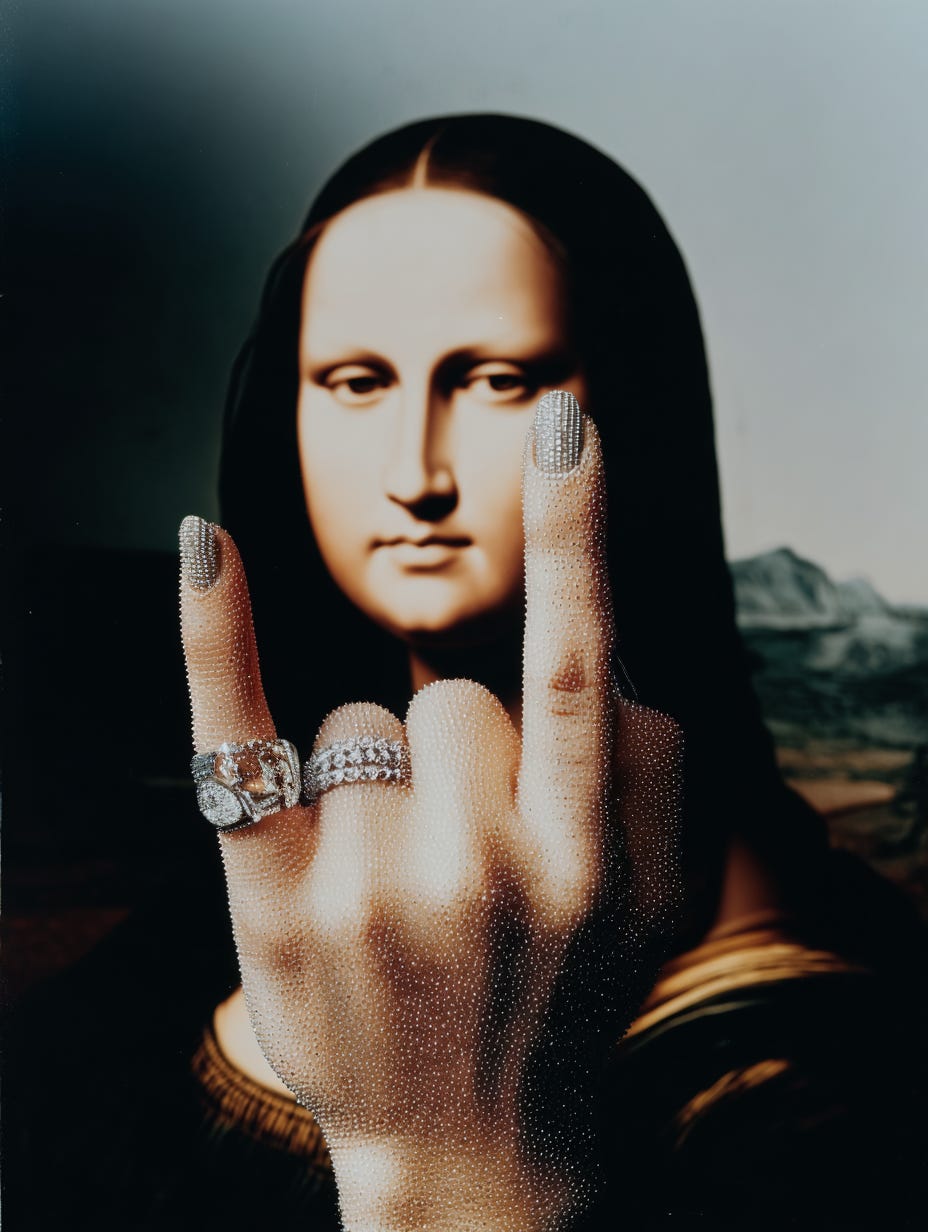


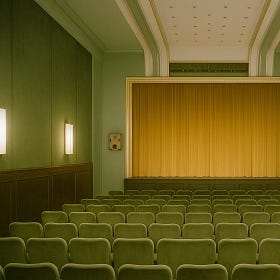

This resonates with me a lot. Regardless of the domain application I don’t think AI replaces the grind. It just removes the friction of getting your ideas out there
Disappointing and lacks inspiration